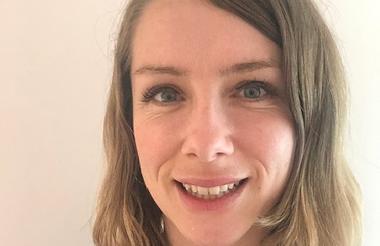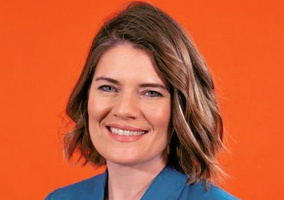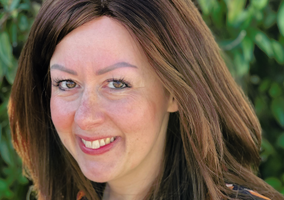It was while delivering Oxfam envelopes around her village as a six-year-old with her mother and collecting money when Anna Lord first understood the excitement of donation and fundraising.
But once finished at university, she started volunteering at what used to be known as Send a Cow, now called Ripple Effect, and she realised working in the charity sector was her calling.
“I knew this was something I was really interested in,” she says. “Particularly in a small team, making a big impact.”
Upon finishing her volunteering work with the charity, she got a job in the supporter care team in an admin role.
“It’s an entry-level job but I was so excited to be in the charity and I quickly realised that it’s the heart of the charity because you are connected immediately to the supporters.
“You end up knowing the most about the charity. That is definitely something I have carried with me.”
Lord later joined current charity Ethiopiaid where she was partnerships manager for 10 years before she took up the role of CEO in April 2025 after Lisa Cousins left the charity.
“Lisa really encouraged me to go for the role,” she says. “I was quite scared. I have a young child and had just returned from maternity leave. It wasn’t the right time and I wasn’t expecting to go for it.
“But I looked at the job description and knew I could do it. I know the organisation inside out. The team has been with us for a long time and I know we have an exciting time coming up.”
First 100 days
Ethiopiaid was founded by British businessman and philanthropist Alec Reed in 1989 and supports partner organisations in Ethiopia.
These partner organisations focus their work on providing increased access to education, improved maternal health care, prevention services and community infrastructure, focusing on supporting the most marginalised and impoverished people.
Lord has been CEO for just over 100 days now and is in charge of the UK and Ireland team.
The charity has sister offices in Ireland, Australia and Canada and she is still getting her head around the different elements the role entails.
“I wasn’t expecting just how much HR is involved,” she says. “The CEO role is less about managing, more about leading.
“I’ve had less contact with our Ethiopian partners than I did in my previous role but I’m beginning to pick this back up again now.
“My expertise is really centred on the UK so learning about the Irish market has been interesting as well because that takes up time.”
Income growth plans
One of Lord’s main goals for Ethiopiaid is to grow its income at a time when many other charities are going under through financial pressure and having to restructure.
Last year, Ethiopiaid’s income was £2.44m, the majority of which came from individual giving, with about £500,000 from partnerships.
Lord has just launched the charity’s new global strategy – and a mantra “Be Brave. Be Bold” – with the aim of more than doubling the charity’s annual income to £5m by the end of 2030.
“The team is quite daunted by that, I’m quite daunted by that,” she says. “But we know Ethiopia and we know our partners, it is doable but we’ve got to be strategic.”
Lord aims to achieve this through greater work with major donors, philanthropy networks and legacy fundraising.
While a fundraising charity, Lord says Ethiopiaid did not put fundraising at the forefront of its old global strategy.
“It’s why we exist, it’s who we are and it’s what we specialise in,” Lord says. “We stripped it right back to our two focuses – global fundraising and investing in Ethiopian organisations.
“I see this as an interim getting our house in order and the next global strategy from 2030 onwards we will be looking at how we can be more global.”
Lord adds: “Part of our strategy is being the specialist charity for people who want to support those in Ethiopia.
“A large part of doing this is making ourselves more visible, more approachable, and raising our profile.”
Diversity challenges
One problem charities still face is employing people from diverse backgrounds, particularly at leadership level.
There is still underrepresentation of people from minoritised ethnic backgrounds, those with disabilities and individuals from lower socio-economic backgrounds, according to research from ACEVO.
Lord has 15 years’ experience in the charity sector and while she says many aid charities are women-led, ethnic diversity is still a problem.
“Where we are in Bath, it’s mostly white women going for charity jobs,” she says. “We do get a lot of applicants from Ethiopia but unfortunately that isn’t feasible because we need people in the office.
“In terms of the sector, my observation is that it is very women-led but much of the charity work focuses on women and girls so this isn’t necessarily a bad thing.
“Men and boys in Ethiopia are often the ones out of work so we need to be communicating about men and boys and employing more men in our team.”
Many UK-based aid charities have announced plans to “move power closer to the cause” in recent years by shifting staff, their HQ and decision-making to the places where they operate.
But for Lord and her team, it is all about continuing to be a “partner-led” charity that works with different individuals and organisations operating on the ground in Ethiopia.
“We pioneered that,” she says. “I’ve looked around and I can’t see many other charities that have done this from the outset.
“We would never have a member of staff travel over to Ethiopia and tell them how to sort out their problems.
“In terms of localisation of aid, this has always been our approach and I’m pleased to see this is the way the sector is moving in.
“It’s ongoing for us because this is the way we’ve always done it.”
Aid cuts
In July, the UK government announced cuts to its foreign aid budget, reducing it from 0.5% to 0.3% of gross national income by 2027 to fund increased defence spending, with the plan extending beyond this period and potentially impacting its role internationally.
In May, US foreign aid faced drastic cuts and freezes under the Trump administration, leading to concerns about increased mortality and severe consequences for human rights and development efforts, although some actions have been blocked by courts.
Ethiopiaid does rely on some government funding but not from the UK or US so it has not been impacted unlike other aid charities.
“We are really lucky because we know charities where that has taken half their income,” Lord says. “While it hasn’t impacted Ethiopiaid, it has impacted some of our partners' work.
“Only one of our partners had a grant from US aid and that project immediately folded.
“Healthcare and education has been impacted and they work through hospitals or schools so they’ve been affected with staff immediately losing their jobs which has slowed down their projects.
“We are trying to see where we might be able to help with our funding and where we can make connections to try and fill those gaps.”
Like many charities, Ethiopiaid has been affected by the rise in employer national insurance contributions.
The charity recorded an income of £2.44m last year and paid £1.95m in grants to its partners in Ethiopia, meaning the charity has small margins for its staff costs.
“It’s a cost we’ve had to absorb,” Lord says. “We had to budget more strictly, it’s a worry.
“We think about the cost-of-living increases for our staff. We are all about poverty relief. We've got to reflect that in our own team.”
Sharing a platform
As part of the charity’s new strategy, Lord is also determined to boost Ethiopiaid’s profile.
“What I mean by that is giving more of a platform to our partners,” she says. “We want to tell their stories. We are looking at how we can get those stories out there and galvanise more people to fund their work.
“If we can grow our income I see that as a real success and team effort because I know we are up against it.
“I do feel really excited about the next five years. I think Ethiopia has got a lot to offer and we are just about playing a really small part in that and helping the partners we have go as far as they can in making a difference.”












